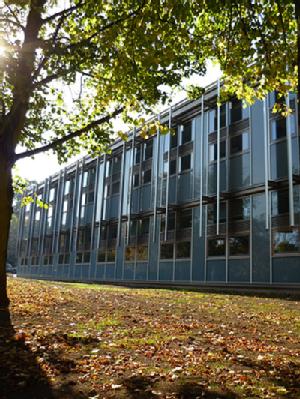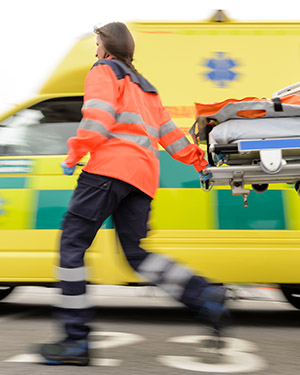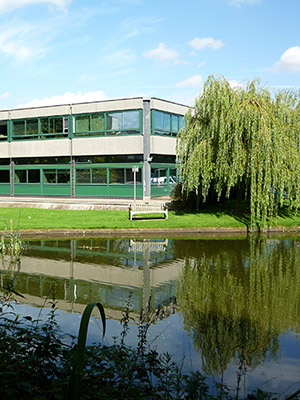Professor Gavin Perkins – Profile of a new Dean

In August 2023, Warwick Medical School welcomed Professor Gavin Perkins as Dean of Medicine. He was previously Director of Warwick Clinical Trials Unit and worked across the School as a member of the Dean’s Executive and Senior Management Group. While he is well known to colleagues in WMS, his new appointment provides a good opportunity to look at the experience he brings to the role and his plans for the future of Warwick Medical School.
Gavin graduated in Medicine from the University of Birmingham, then trained as a critical care and respiratory physician working in hospitals in the West Midlands region. He combined his clinical duties with roles of Research Fellow and Clinical Lecturer at the University of Birmingham.
On completion of his specialist training, he was appointed as a National Institute for Health Research (NIHR) Clinician Scientist, which enabled him to move his appointment over to the newly formed Warwick Clinical Trials Unit. Soon after Gavin’s arrival, he developed a portfolio of clinical trials and applied health research in emergency and critical care medicine to reflect his clinical practice. He also launched the School’s first postgraduate offering in pre-hospital critical care, which has now evolved to become the Advanced Clinical Practice Master's programmeLink opens in a new window at Warwick.
 After working in the Clinical Trials Unit for a number of years, he became the Unit’s Director in 2018, co-creating the vision to deliver world class clinical trials that will transform the lives of patients. Under his leadership the group grew to become the largest trials unit supported by the National Institute for Health and Social Care Research in the UK.
After working in the Clinical Trials Unit for a number of years, he became the Unit’s Director in 2018, co-creating the vision to deliver world class clinical trials that will transform the lives of patients. Under his leadership the group grew to become the largest trials unit supported by the National Institute for Health and Social Care Research in the UK.
Gavin has led a number of large, successful trials from his early work considering the use of beta agonists to help critically ill patients with Acute Respiratory Distress Syndrome (ARDS) that formed the BALTI trialsLink opens in a new window. Other research undertaken in hospital-based critical care settings include the BREATHELink opens in a new window trial, which investigated the best way to wake a patient up and help them to come off a ventilator after a period of critical illness. During the pandemic, the RECOVERY - Respiratory SupportLink opens in a new window trial was able to scrutinise the effectiveness of different ventilation strategies in people with COVID-19. In this trial the high-pressure CPAP mask was found to be more effective than the use of standard oxygen. The results led to the requirement to implement respiratory support units across the NHS nationwide.
Outside of the hospital setting, Gavin has led some of the world’s largest trials in pre-hospital care in partnership with NHS Ambulance Services. The Resuscitation with Pre-Hospital Blood ProductsLink opens in a new window (RePHILL) trial was the first randomised controlled trial to investigate if bringing blood transfusion from the hospital to the roadside would improve patient outcomes. The PARAMEDIC series of studies focused on patients with cardiac arrest. The first PARAMEDICLink opens in a new window trial investigated the use of a mechanical device to sustain circulation after cardiac arrest. The trial won the acclaimed International Society for Clinical Trials Trial of the Year AwardLink opens in a new window in 2014. This prestigious award is made based on several criteria including that the research improves the lot of humankind and provides the basis for a substantial, beneficial change in health care. PARAMEDIC 2Link opens in a new window followed, looking at whether adrenaline was helpful or harmful in patients following cardiac arrest. PARAMEDIC 3,Link opens in a new window which is currently in progress across England and Wales, explores whether the most effective way to administer drugs post cardiac arrest is via a drip into a vein or an infusion into the bone marrow.
Alongside his teaching and research commitments he has played key leadership roles in the international resuscitation community, working with colleagues from more than 30 countries worldwide with the aim to save more lives globally through resuscitation. His interest and leadership in the field of resuscitation saw the International Liaison Committee on Resuscitation award Gavin the honorary title of Resuscitation Giant for his work in this area.
His contribution to academic medicine has been recognised through election to the Academy of Medical Sciences and appointment as a National Institute for Health and Social Care Research Senior Investigator. He was also recognised as a highly cited researcher by Clarivate in 2022.
Outside of his core role as Dean of Medicine, Gavin continues to work part-time in clinical practice as an intensive care doctor and as a volunteer doctor for West Midlands Ambulance Service. He also serves as a non-executive director at UHCW and as a Trustee and Vice President of the Resuscitation Council UK.
Having clearly had an impressive clinical and research career thus far, Gavin admitted that being Dean of Medicine hadn’t initially been a career goal of his.
He said, “I have always loved my clinical practice, being active in research and teaching. However, once the opportunity presented itself at Warwick Medical School, I reflected on the excellence of my colleagues and the great opportunities that the Medical School has, and I felt my leadership could provide a valuable contribution to the evolution and success of the School."
Responding to current healthcare challenges

Gavin begins his term as Dean at a time when the NHS workforce is facing many challenges. Pressures are increasing day by day. The country has an ageing population with increasingly complex health demands and waiting lists are becoming longer. In addition, the workforce is still recovering from the significant impact of the COVID-19 pandemic and its impact on their wellbeing and morale. All the more reason for Warwick Medical School to be poised to help support its NHS partners at this difficult time.
On considering the challenges ahead, Gavin said, “There is now an NHS Workforce Long Term Plan that looks to double the number of doctors over the next 10 years. One of our challenges as a medical school is to respond by growing our MB ChB programme in partnership with our NHS providers in the region. We are the largest graduate entry medical school in the UK and are extremely proud of our Warwick Doctors who have highly sought after attributes and achieve the highest of graduate outcomes behind Oxford and Cambridge universities. It provides an excellent opportunity for us to help deliver on that aspect of the workforce plan.”
It has always been paramount that we provide excellent education and teaching. We have a high-quality portfolio from our undergraduate provision, right through to our postgraduate taught and research degrees. Our new undergraduate courses: BSc Health and Medical SciencesLink opens in a new window, the first cohort of which graduated earlier this year, and our four-year MSci Integrated Natural SciencesLink opens in a new window which will graduate next year are both unique due to their multi-disciplinary and integrated approach to tackling issues in health. Both programmes will equip graduates with high levels of employability for the future direction of the health care sector. Our postgraduate portfolioLink opens in a new window has gone from strength to strength providing valuable, relevant courses to healthcare professionals both in the UK and internationally in partnership with online education provider iheedLink opens in a new window.
We are also proud of our flagship MRC DTP programmeLink opens in a new window in Interdisciplinary Biomedical Research, training students across the disciplines of life and physical sciences. In addition, we offer the prestigious A* Star research attachment programmeLink opens in a new window, providing PhD studentships in molecular cell biology and microbiology, both at Warwick and in Singapore.
WMS strategy review
One of Gavin’s early priorities is to review WMS’ current strategy and ensure it is fit for purpose. He said, “We developed a strategy that was approved in December 2019, but COVID followed shortly thereafter and there was little opportunity to put it into practice. Now that we have emerged from COVID and I am newly in post, it is the ideal time to review it through an education and research lens. We will continue with the objectives that are still relevant, discontinue things that aren’t and identify potential new areas of consideration that we perhaps hadn’t thought about back in 2019.”
Warwick Medical School has three existing areas of research excellence within the School: Warwick Clinical Trials Unit, Biomedical Sciences and Applied Health Research. Gavin continues, “One of the gaps we identified in our 2019 strategy is the golden thread linking those areas together and we are delighted to have received funding through the University Strategy Investment Fund (SIF) to develop a cross cutting Institute of Translational Medicine.
 This will enable us to develop research strength from the world class discovery science that our teams in Biomedical Sciences are engaged with in the lab to the clinic and back, to then demonstrate in the real world that those new interventions are clinically impactful and cost effective.”
This will enable us to develop research strength from the world class discovery science that our teams in Biomedical Sciences are engaged with in the lab to the clinic and back, to then demonstrate in the real world that those new interventions are clinically impactful and cost effective.”
“Innovation is also an important part of our strategy, and we look forward to exciting opportunities such as the University’s supra-regional health innovation campus, Arden Cross. WMS is ideally situated to help accelerate the success of that initiative. Connectivity is important to WMS both at a local level within the University itself, within the region, nationwide and internationally. We will strive to strengthen those links and develop new ones that will enable us to realise our ambitions.”
Looking ahead
A strong focus for Gavin is the people of Warwick Medical School being the key to its continued success. On considering the future, and what success will look like, Gavin reflected:
“In 2025 Warwick Medical School will be 25 years old. We are still a relatively young medical school, especially compared to many of our peers who are over 100 years old. Our relative youth and size dictates that we won’t be able to excel in all areas of clinical medicine but what it does mean is that we will be excellent with purpose in selected, specific strength areas. Success will include the continued growth and strengthening of our international reputation, our education portfolio and our research specialities. The people of WMS make the School the great place it is. It is my role to help grow and develop a vibrant and engaging environment that will allow the people of WMS to excel in education and research not only within their own groups but together as one School, working towards a common goal united by our values.”

